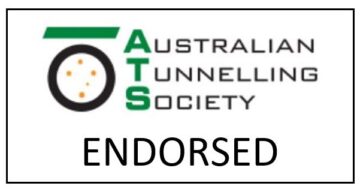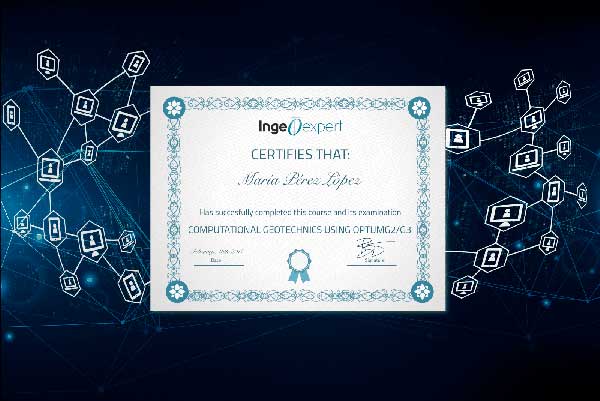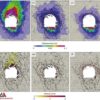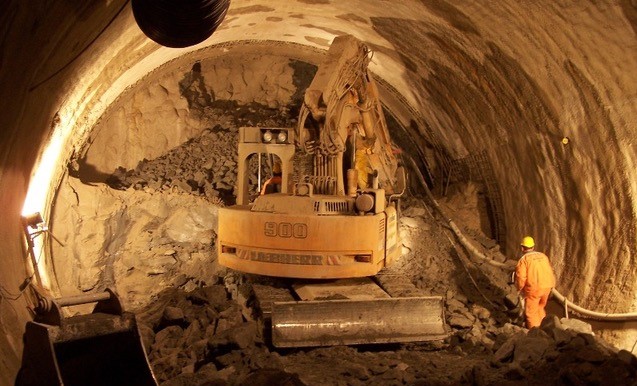Introduction
With the ever increasing urbanization in the world, the demand for underground space continues to grow. Very many urban areas are located on soft ground. Hence tunnellers need to understand how to create underground spaces in this type of strata. In this context, soft ground is defined as a geomaterial with a low strength – such sand or clay, conglomerate or weak rocks like siltstone or chalk. These geomaterials tend to behave largely as continuum. In harder rock (under low stress), discontinuous behaviour tends to dominate – such as block stability. Hence the construction and design of tunnels in harder rock is distinctly different.
First, this course will look at the over-arching principles of design in the context of soft ground. Topics such as safety, risk management, sustainability and design codes will be covered in outline. The key aspects of geotechnics will be highlighted, on the assumption that the attendees have a basic understanding of this subject already.
To design and construct, safe, economic and sustainable tunnels in soft ground, it is essential to understand the interplay between the geology, the hydrogeology and the underground space being formed. This involves soil-structure interaction. The key mechanisms acting in these cases will be examined as the first step to identifying the geohazards and then defining risk mitigation measures. The control of water – both in the temporary and permanent cases – is an important subject in its own right. The course will introduce the armoury of tools available and outline their optimum range of application.
The course will introduce the common types of construction used in soft ground – namely, cut and cover, TBM tunnels with segmental linings, Sprayed concrete lined tunnels (also known as SCL or NATM). The logic for choosing which method is best will be explained. All of the construction methods influence the design but this interplay is most pronounced with SCL tunnels. For this reason, one module is dedicated to SCL tunnelling, covering all aspects from the mix design and properties of sprayed concrete, through to construction sequences and modern design approaches (including composite lining theory).
Design calculations generally rely on tools which are empirical, analytical or numerical methods. Suitable tools for soft ground in each of these categories will be presented so that attendees can learn about how and when to use each one. Settlement and ground movements are a major concern in urban areas. The prediction of settlement and ways to mitigate the ground movements form an important part of the design of tunnels in soft ground. The design of special structures such as portals, shafts and tunnel junctions will also be covered.
Objectives
From this course, you will gain an understanding of:
- The key design principles for soft ground tunnels
- The importance of soil-structure interaction
- Construction methods for soft ground tunnels
- Design methods for tunnel linings
- Sprayed concrete lined tunnels in soft ground
In addition, you will obtain an insight into many related topics such as ground treatment, instrumentation and monitoring and sustainability. Each subject will be illustrated with easy to understand examples and practical cases. This will bring the subject to life in a way that normal textbooks cannot. This course will be delivered by a highly experienced lecturer who will share the knowledge that he has gathered over a career of more than 25 years.
Limited places.
MODULE 1. General design
The course starts with a recap on general design methodology within the context of soft ground to ensure that all participants have the correct foundation for this course. A risk-based design is essential for safe designs and this is implicit or explicit in all design work. The boundaries of soft ground (vs hard rock) will be outlined. A wide range of factors influence a design such as functional requirements like waterproofing, fire protection and durability as well structural performance. Sustainability will be examined in detail.
MODULE 2. Soil-structure interaction
The biggest influence on any tunnel is the ground. A thorough understanding of the type of ground and the hydrogeology is required in order to identify the key mechanisms of ground behaviour. This governs the choice of construction method and from the two arise the design calculations. By focusing on the fundamentals of ground behaviour, the course will show how to develop safe and cost-effective solutions in any situation. Settlement is a key concern for soft ground tunnelling. Prediction, monitoring and mitigation of settlement will be discussed.
MODULE 3. Construction methods
Having understood the mechanisms present, a construction method can be chosen to manage these risks effectively. This has an influence on the design so this topic appears before design. Common construction techniques in soft ground tunnelling include: cut & cover; TBMs with segmental linings; sprayed concrete lined tunnels (SCL/NATM). Immersed tube tunnels and pipejacking are less common so they will only be discussed briefly. In addition ground treatment is sometimes used to reduce water ingress or to improve the ground.
MODULE 4. Design methods
There are three type of (structural) design methods – empirical, analytical and numerical method. Each one will be examined in detail, considering the common tools used for soft ground cases. Guidance will be given on how and when to use each method, as well as their benefits and limitations. Special structures such as portals, junctions and shafts will be considered, along with special design cases such as seismic loading and fire.
MODULE 5. Sprayed concrete linings (SCL/NATM)
This module will look in detail at SCL tunnelling in soft ground, beginning with mix design and material technology, then advancing to the properties of sprayed concrete and material behaviour. Construction methods, including the excavation sequence, have a large influence on design so this will be explored before explaining the common analytical and numerical design methods. Construction management and monitoring play a key role in successful SCL tunnelling.
Dr Alun Thomas
- – Alun has a broad experience of many types of tunnelling methods from immersed tubes to segmental linings, from closed face TBMs to hand excavation under compressed air. He has a specialism in sprayed concrete lined (SCL/NATM) tunnels and numerical modelling, using a wide range of calculation programs. With a reputation for innovation, he has been involved in promoting sustainability in tunnelling, the use of permanent sprayed concrete, fibre reinforcement and spray-applied waterproof membranes. Since graduating from Cambridge University, over the last 25 years, he has been involved in many of the recent major UK tunnelling projects such as the Jubilee Line Extension, Heathrow Express, Terminal 5, Crossrail and the Lower Thames Crossing, as well as working on design and construction of tunnels internationally. Notably he has worked in Denmark, Russia, USA, Iceland, Hungary, Singapore, India, Norway and Hong Kong.
- – Alun has given lectures at the British Tunnelling Society course, Leeds University, the Budapest Technical University and the Danish Technical University. A regular contributor to magazines and conferences with more than 50 publications, he has written articles on subjects ranging from geotechnical monitoring to user-friendly contracts. A second edition of his book, “Sprayed concrete lined tunnels”, is in production in addition to the Chinese and Turkish versions of the first edition. Alun is Vice Animateur of the ITA’s Working Group 12 on Sprayed Concrete and was chairman of ITAtech’s activity group for Fibre Reinforced Concrete Precast Segments.
- – Alun is a Chartered engineer and a Member of the Institution of Civil Engineers, in the UK.
The course is delivered online through our easy-to-use Virtual Campus platform. For this course, a variety of content is provided including:
– eLearning materials
– Videos
– Interactive multimedia content
– Live webinar classes
– Texts and technical articles
– Case studies
– Assignments and evaluation exercises
Students can display the materials and work through the course at their own pace.
We regularly update this course to ensure the latest news and state-of-the-art developments are covered, and your knowledge of the subject is current.
Live webinars form part of our course delivery. These allow students and tutors to go through the course materials, exchange ideas and knowledge, and solve problems together in a virtual classroom setting. Students can also make use of the platform’s forum, a meeting point to interact with tutors and other students.
The tutoring system is managed by email. Students can email the tutor with any questions about the course and the tutor will be happy to help.
This course is aimed at professionals who have some undergraduate understanding of soil mechanics and geomechanics and basic structural engineering. Potential attendees include:
– Geology, Geotechnical or Civil Engineering post-graduate students interested in learning the principles of soft ground tunnelling
– Geology, Geotechnical or Civil Engineering professionals who want to pursue or transition into a tunneling career
– Tunneling practitioners (technicians and engineers alike) who need to refresh or update their knowledge of soft ground tunnelling
– Structural Engineering professionals who want to have a more comprehensive understanding of the role of the ground in tunnel engineering
This course is suitable for engineers working in all parts of this sector: clients; designers and contractors.
Once a student finishes the course and successfully completes the assignments and evaluation tests, they are sent an accreditation certificate. The certificate is issued by Ingeoexpert to verify that the student has passed the course. It is a digital certificate that is unique and tamper-proof – it is protected by Blockchain technology. This means it is possible for anyone to check that it is an authentic, original document.
You will be able to download the certificate in an electronic format from the Virtual Campus platform. The certificate can be forwarded by email, shared on social networks, and embedded on websites. To see an example, click here.
With the ever increasing urbanization in the world, the demand for underground space continues to grow. Tunnels for transportation (motorways, railways, metros) and for public utilities (water supply, sewerage, electrical and telephone cables) are a priority in all countries. As the pressure of surface space intensifies, planners are turning to underground structures as a way to free up that space and improve our quality of life. All sorts of facilities are being moved underground from libraries to museums, car parking to leisure facilities). There has never been a better time to become a tunneling engineer.
Very many urban areas are located on soft ground. Hence tunnellers need to understand how to create underground spaces in this type of strata. This course will enable you to take your existing skills and transition into this growing sector or to deepen your existing knowledge so that you can reach new, exciting opportunities.


Introduction
With the ever increasing urbanization in the world, the demand for underground space continues to grow. Very many urban areas are located on soft ground. Hence tunnellers need to understand how to create underground spaces in this type of strata. In this context, soft ground is defined as a geomaterial with a low strength – such sand or clay, conglomerate or weak rocks like siltstone or chalk. These geomaterials tend to behave largely as continuum. In harder rock (under low stress), discontinuous behaviour tends to dominate – such as block stability. Hence the construction and design of tunnels in harder rock is distinctly different.
First, this course will look at the over-arching principles of design in the context of soft ground. Topics such as safety, risk management, sustainability and design codes will be covered in outline. The key aspects of geotechnics will be highlighted, on the assumption that the attendees have a basic understanding of this subject already.
To design and construct, safe, economic and sustainable tunnels in soft ground, it is essential to understand the interplay between the geology, the hydrogeology and the underground space being formed. This involves soil-structure interaction. The key mechanisms acting in these cases will be examined as the first step to identifying the geohazards and then defining risk mitigation measures. The control of water – both in the temporary and permanent cases – is an important subject in its own right. The course will introduce the armoury of tools available and outline their optimum range of application.
The course will introduce the common types of construction used in soft ground – namely, cut and cover, TBM tunnels with segmental linings, Sprayed concrete lined tunnels (also known as SCL or NATM). The logic for choosing which method is best will be explained. All of the construction methods influence the design but this interplay is most pronounced with SCL tunnels. For this reason, one module is dedicated to SCL tunnelling, covering all aspects from the mix design and properties of sprayed concrete, through to construction sequences and modern design approaches (including composite lining theory).
Design calculations generally rely on tools which are empirical, analytical or numerical methods. Suitable tools for soft ground in each of these categories will be presented so that attendees can learn about how and when to use each one. Settlement and ground movements are a major concern in urban areas. The prediction of settlement and ways to mitigate the ground movements form an important part of the design of tunnels in soft ground. The design of special structures such as portals, shafts and tunnel junctions will also be covered.
Objectives
From this course, you will gain an understanding of:
- The key design principles for soft ground tunnels
- The importance of soil-structure interaction
- Construction methods for soft ground tunnels
- Design methods for tunnel linings
- Sprayed concrete lined tunnels in soft ground
In addition, you will obtain an insight into many related topics such as ground treatment, instrumentation and monitoring and sustainability. Each subject will be illustrated with easy to understand examples and practical cases. This will bring the subject to life in a way that normal textbooks cannot. This course will be delivered by a highly experienced lecturer who will share the knowledge that he has gathered over a career of more than 25 years.
Limited places.
MODULE 1. General design
The course starts with a recap on general design methodology within the context of soft ground to ensure that all participants have the correct foundation for this course. A risk-based design is essential for safe designs and this is implicit or explicit in all design work. The boundaries of soft ground (vs hard rock) will be outlined. A wide range of factors influence a design such as functional requirements like waterproofing, fire protection and durability as well structural performance. Sustainability will be examined in detail.
MODULE 2. Soil-structure interaction
The biggest influence on any tunnel is the ground. A thorough understanding of the type of ground and the hydrogeology is required in order to identify the key mechanisms of ground behaviour. This governs the choice of construction method and from the two arise the design calculations. By focusing on the fundamentals of ground behaviour, the course will show how to develop safe and cost-effective solutions in any situation. Settlement is a key concern for soft ground tunnelling. Prediction, monitoring and mitigation of settlement will be discussed.
MODULE 3. Construction methods
Having understood the mechanisms present, a construction method can be chosen to manage these risks effectively. This has an influence on the design so this topic appears before design. Common construction techniques in soft ground tunnelling include: cut & cover; TBMs with segmental linings; sprayed concrete lined tunnels (SCL/NATM). Immersed tube tunnels and pipejacking are less common so they will only be discussed briefly. In addition ground treatment is sometimes used to reduce water ingress or to improve the ground.
MODULE 4. Design methods
There are three type of (structural) design methods – empirical, analytical and numerical method. Each one will be examined in detail, considering the common tools used for soft ground cases. Guidance will be given on how and when to use each method, as well as their benefits and limitations. Special structures such as portals, junctions and shafts will be considered, along with special design cases such as seismic loading and fire.
MODULE 5. Sprayed concrete linings (SCL/NATM)
This module will look in detail at SCL tunnelling in soft ground, beginning with mix design and material technology, then advancing to the properties of sprayed concrete and material behaviour. Construction methods, including the excavation sequence, have a large influence on design so this will be explored before explaining the common analytical and numerical design methods. Construction management and monitoring play a key role in successful SCL tunnelling.
Dr Alun Thomas
- – Alun has a broad experience of many types of tunnelling methods from immersed tubes to segmental linings, from closed face TBMs to hand excavation under compressed air. He has a specialism in sprayed concrete lined (SCL/NATM) tunnels and numerical modelling, using a wide range of calculation programs. With a reputation for innovation, he has been involved in promoting sustainability in tunnelling, the use of permanent sprayed concrete, fibre reinforcement and spray-applied waterproof membranes. Since graduating from Cambridge University, over the last 25 years, he has been involved in many of the recent major UK tunnelling projects such as the Jubilee Line Extension, Heathrow Express, Terminal 5, Crossrail and the Lower Thames Crossing, as well as working on design and construction of tunnels internationally. Notably he has worked in Denmark, Russia, USA, Iceland, Hungary, Singapore, India, Norway and Hong Kong.
- – Alun has given lectures at the British Tunnelling Society course, Leeds University, the Budapest Technical University and the Danish Technical University. A regular contributor to magazines and conferences with more than 50 publications, he has written articles on subjects ranging from geotechnical monitoring to user-friendly contracts. A second edition of his book, “Sprayed concrete lined tunnels”, is in production in addition to the Chinese and Turkish versions of the first edition. Alun is Vice Animateur of the ITA’s Working Group 12 on Sprayed Concrete and was chairman of ITAtech’s activity group for Fibre Reinforced Concrete Precast Segments.
- – Alun is a Chartered engineer and a Member of the Institution of Civil Engineers, in the UK.
The course is delivered online through our easy-to-use Virtual Campus platform. For this course, a variety of content is provided including:
– eLearning materials
– Videos
– Interactive multimedia content
– Live webinar classes
– Texts and technical articles
– Case studies
– Assignments and evaluation exercises
Students can display the materials and work through the course at their own pace.
We regularly update this course to ensure the latest news and state-of-the-art developments are covered, and your knowledge of the subject is current.
Live webinars form part of our course delivery. These allow students and tutors to go through the course materials, exchange ideas and knowledge, and solve problems together in a virtual classroom setting. Students can also make use of the platform’s forum, a meeting point to interact with tutors and other students.
The tutoring system is managed by email. Students can email the tutor with any questions about the course and the tutor will be happy to help.
This course is aimed at professionals who have some undergraduate understanding of soil mechanics and geomechanics and basic structural engineering. Potential attendees include:
– Geology, Geotechnical or Civil Engineering post-graduate students interested in learning the principles of soft ground tunnelling
– Geology, Geotechnical or Civil Engineering professionals who want to pursue or transition into a tunneling career
– Tunneling practitioners (technicians and engineers alike) who need to refresh or update their knowledge of soft ground tunnelling
– Structural Engineering professionals who want to have a more comprehensive understanding of the role of the ground in tunnel engineering
This course is suitable for engineers working in all parts of this sector: clients; designers and contractors.
Once a student finishes the course and successfully completes the assignments and evaluation tests, they are sent an accreditation certificate. The certificate is issued by Ingeoexpert to verify that the student has passed the course. It is a digital certificate that is unique and tamper-proof – it is protected by Blockchain technology. This means it is possible for anyone to check that it is an authentic, original document.
You will be able to download the certificate in an electronic format from the Virtual Campus platform. The certificate can be forwarded by email, shared on social networks, and embedded on websites. To see an example, click here.
With the ever increasing urbanization in the world, the demand for underground space continues to grow. Tunnels for transportation (motorways, railways, metros) and for public utilities (water supply, sewerage, electrical and telephone cables) are a priority in all countries. As the pressure of surface space intensifies, planners are turning to underground structures as a way to free up that space and improve our quality of life. All sorts of facilities are being moved underground from libraries to museums, car parking to leisure facilities). There has never been a better time to become a tunneling engineer.
Very many urban areas are located on soft ground. Hence tunnellers need to understand how to create underground spaces in this type of strata. This course will enable you to take your existing skills and transition into this growing sector or to deepen your existing knowledge so that you can reach new, exciting opportunities.
18 reviews for Soft ground tunnelling course
More info
Finish this course and get a certificate based on Blockchain
Soft ground tunnelling course


Blockchain technology makes the certificate incorruptible, enabling companies to verifiy its autenticity.





Chidochashe Clemency Nhema –
The course was really insightful, rich in knowledge and new information. the webinars were interactive and the teach was responsive and had a positive attitude when grading assignments. Moreover, the teach would give feedback on all assignments and he would provide you with his answers. Great course!
Dallas Adams –
I have worked in the tunnelling industry as an operator and electrician for 20 years and this course gave me a better understanding of certain ground conditions and methodologies used for tunnelling through the soft ground or what we call as tunnellers BAD ground. I now respect tunnelling more and appreciate the hard work, time, effort and dedication from engineers, SME and designers to come up with the best and safest practice. Thank you to Alun Thomas for facilitating this great webinar on soft ground tunnelling. I highly recommend to all tunnellers this course and/or companies to support courses similar for tunnel inductions and tunnel qualifications.
Tim Howard –
Alun was a very knowledgeable professor, course notes and webinars were all well structured and exercises helped put everything into context. Thank you !
Ramy Awad –
Excellent instructor and course material.
Phuntsho Gayleg Namgyel –
I loved the coursework and the knowledge shared. This course has guided me through the general aspects of what a tunnel engineering is all about starting from why risk management is required to the actual design and construction aspects of not only sprayed concrete tunnel but could be even referenced to any tunneling design and constructions. All the materials provided in the course can kept as a guiding source of knowledge in future for any tunneling engineers across the globe.
Sachin Gavhane –
Alun as a instructor was Awesome. His Grasp on the subject of Soft Ground Tunneling and clarity of thought made the course interesting.The Notes Provided are excellent source of Information and in a crisp yet coherent manner covers all the essentials.
Ashok Kumar –
I am new to tunnel technology and find the course very effective to Start.
Riccardo Perlo –
What I appreciated the most was the live exchange of information and experience between lecturer and attendees, at all level. This attitude made the whole difference, making this approach truly effective. I like it very much.
Samuel Solorzano –
Alun Thomas gave a brief explanation of all major points in softground tunnelling mainly in sprayed concrete lining. I would definitely recommend this course to anyone interested in understanding tunnels.
Ciara Maguire –
I loved how the course material was taught through webinars, presentations and course notes.
Olonilua Olalekan –
It is a major eye opener. The instructor demonstrated a great deal of knowledge and experience.
Ahmed Abdelrazek –
Very useful content and informative presentations throughout the course. Alun Thomas is dedicated, well diversed in tunneling projects worldwide. Recommended for junior engineers and tunneling professionals who are looking to freshen up their knowledge on tunneling in soft grounds.
Alie Assefa Ashebir –
I really enjoyed the course.
Sina Hojjat –
Based on my experience Dr. Thomas is one the most knowledgeable scientists in the area of Tunneling and specifically in Soft Ground. He covered diverse range of topics in this area including conceptual design, empirical calculations, numerical approach and constrcution of the tunnels. He supported the course with excellent set of slides and notes and completed each session with purposeful assignments. He actively answered the questions during and beyond the course hours and provided diverse range of references for the additional reading.
Ashraf Hussain –
This online campus is really effective. Great Course content and schedule and method of delivery organized wonderfully. Enjoyed learning Soft Ground Tunneling at Ingoexpert online campus.
Jack Raymer –
This course was at just the right level for me. I have many years in the hard-rock tunneling industry but not much with soft-ground SCL tunnels. This gave me a good overview of what is important and where I would need to hire an experienced modeller.
Raditya Ahmad Syah Arrafi –
This course is highly recommended for engineers who want to learn about tunneling in soil. The course covers aspects from design to construction.
Manthrinayaka Arachchiralalage Amil Prasantha Kumara Manthrinayake –
This is highly valuable course focused on designing underground tunnels, providing essential materials and UK specific code of practices. The knowledge gained is complemented by Alun’s extensive experience in tunnelling design and monitoring.